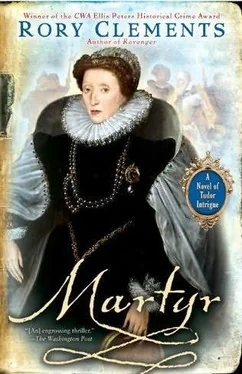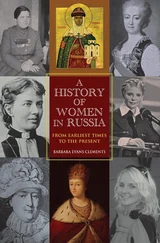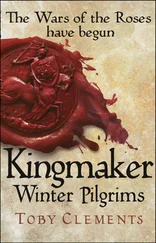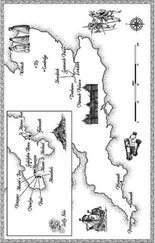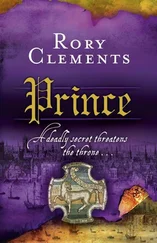Rory Clements - Martyr
Здесь есть возможность читать онлайн «Rory Clements - Martyr» весь текст электронной книги совершенно бесплатно (целиком полную версию без сокращений). В некоторых случаях можно слушать аудио, скачать через торрент в формате fb2 и присутствует краткое содержание. Жанр: Исторический детектив, на английском языке. Описание произведения, (предисловие) а так же отзывы посетителей доступны на портале библиотеки ЛибКат.
- Название:Martyr
- Автор:
- Жанр:
- Год:неизвестен
- ISBN:нет данных
- Рейтинг книги:3 / 5. Голосов: 1
-
Избранное:Добавить в избранное
- Отзывы:
-
Ваша оценка:
- 60
- 1
- 2
- 3
- 4
- 5
Martyr: краткое содержание, описание и аннотация
Предлагаем к чтению аннотацию, описание, краткое содержание или предисловие (зависит от того, что написал сам автор книги «Martyr»). Если вы не нашли необходимую информацию о книге — напишите в комментариях, мы постараемся отыскать её.
Martyr — читать онлайн бесплатно полную книгу (весь текст) целиком
Ниже представлен текст книги, разбитый по страницам. Система сохранения места последней прочитанной страницы, позволяет с удобством читать онлайн бесплатно книгу «Martyr», без необходимости каждый раз заново искать на чём Вы остановились. Поставьте закладку, и сможете в любой момент перейти на страницу, на которой закончили чтение.
Интервал:
Закладка:
“Nothing, Master Shakespeare, nothing is the matter. But so much has happened since you have been away. I do not know where to start.”
“Well, you could start by helping me pull off my boots. I fear they may be glued to my calves. And then some ale would go down well.”
Jane’s face broke into a colossal smile and then she burst into tears, gathered up her skirts, and ran away into another room. Shakespeare watched her in bemusement, then took off his hat and sat on a three-cornered stool in the hallway to attempt the removal of his boots alone.
He had wrenched off the right one after much tugging and was working the left one loose when he heard the door open and looked up. Their eyes met and held.
“Catherine,” he said. It was little more than a whisper.
She stood in the doorway. “Hello, John.” She held out a paper. “I bring you an invitation. From Little Bird and Queenie. It says they are opening an establishment of unimaginable luxury and would be honored to entertain you as a guest.”
Shakespeare tore his eyes from hers and tugged impatiently at his boot. He did not know what to say. “They helped me with my investigation-pointed me toward Plymouth,” he muttered.
“Well then, you must certainly accept their invitation.” She noticed his fumblings. “Do you need some assistance, John?”
He laughed and tears pricked his eyes. “Indeed, I do.”
She knelt before him and pulled his boot loose with one tug, then held it aloft. “Perhaps you should dismiss that useless maidservant of yours and take me on instead.”
“Catherine?”
“Indeed, it is me.”
“Thank God you’re here.”
“Or you would never have loosened your left boot.”
She rose from her knees. He thought she had never looked lovelier. Her dark hair shone and he could not help himself reaching out to touch it.
“You may kiss me if you wish, John.”
He took her in his arms and their mouths met. She let his boot slip from her hand to the floor, then slid her hands around him and held him to her. “I have caught you now, Mr. Shakespeare.”
“Did I fight so hard to escape you, Mistress Marvell?”
“Perchance not, but I have caught you anyway.”
“And I you. I hope. Will you marry me, mistress?”
“I will insist upon it, sir, for I believe you have already stolen my maidenhead. And such a theft cannot go unpunished.”
“As I recall, you colluded in the misdemeanor.”
“Then we are confederates and must suffer our punishment together. Marriage it must be.”
“And all for a maidenhead.” He held her closer. They kissed again.
At last she stood back. “Well, sir, I see you are as forward as ever. I offered you a kiss, not a feasting.”
He laughed. “Catherine, how has this come about? I thought your duty to Master Woode had precluded our match. Has he recovered sufficiently?”
Of a sudden she became serious. “No.” She shook her head. “No, he will never fully recover, but we have a plan. Master Woode insisted on it and I can see no barrier to it. Though you may have objections, John.”
“What plan?”
“This news should not come from me but from Boltfoot and Jane. They will be seeking your permission to marry. Jane’s father has already blessed their union.”
“Well, of course I will permit them to marry. But how does that affect us?”
“Master Woode is crippled and needs more help than I can give him alone. I am physically not strong enough to lift him and attend to all his wants. Jane suggested she and Boltfoot might work for him. She does get on exceeding well with the children.”
Shakespeare laughed. It was all so improbable. “So we are to do an exchange. Jane and Boltfoot go to Thomas Woode and I get you in return.”
“Not a very good deal is it, John? Lose two, gain one.”
“Well, no, put like that, it is not at all a good trade. And most like I will have to turn to schoolmastering, for I will of a certain fall foul of Mr. Secretary.”
“We will both be teachers, then, for I will still go to Dowgate six days a week to tutor the children. I am, after all, their governess.”
“Two and a half to Master Woode, then, and only half to me.”
“Do we have a trade, then, sir?”
“Oh yes, dearest Catherine, we have a trade. But Boltfoot still works for me as and when he is needed.”
“Let us shake on it like merchants then.”
“No,” said Shakespeare, reaching for her again, “let us seal it with a kiss instead.”
Father Robert Southwell, also known as Cotton, walked the dark early morning streets from his new lodging in Holborn, down toward the bridge. He was on his way to the Marshalsea once more, to bring Mass and comfort to the faithful there. As he approached the river, a gray fog rose, swirling, from the water.
The stooped, cowled figure of a woman hurried past him along New Fish Street. Southwell did not break his stride, but watched her bustle along ahead of him. She was bent over as if she could shrink herself to the size of an ant and not be seen. She walked on to London Bridge and her pace faltered. Slowly she trod along the central walkway through the grand houses that lined most of the crossing. Southwell held back, observing her. She was more than halfway across, just before the Drawbridge Gate, when she stopped. She went to the edge of the bridge and looked down from the parapet on the eastern side. Below her the Thames surged and raced and beckoned.
In her arms, beneath her long cloak, she held a baby. All its body apart from its head was wrapped in sacking. For a brief moment she looked down into its curious, monstrous eyes. Then she slipped a large stone into the sack with the baby. She pulled the sacking over the baby’s head and tied it closed with string. The baby screamed from within like a cat.
Southwell froze at the sound. It was a noise he had heard before in another place. He moved toward the woman, but she was already holding the sack with the baby and the stone out over the parapet. Without hesitation, she let it drop into the fast-flowing waters below. For a moment it seemed it might float; the sackcloth billowed over the swell of the water, but then it filled and sank. Tears streamed down the woman’s face. She turned, saw the face of the man approaching her, and brushed past him. Without looking around, she hurried back over the bridge. Back to her large house, her expensive tapestries, her clothes of gold and silver threads, her many servants and her rich merchant husband.
Blessed Victory for boldSir Francis Forgive us, dear reader, for the recent absence of this your best-favoured broadsheet, but we have lately sustained an enforced absence. That episode is happily at an end thanks to the gracious offices of that most loyal and upright servant of the Crown Mr Richard Topcliffe, the Member of Parliament for Old Sarum. We are now at liberty to do our pleasant duty as London’s foremost harbinger of news and report on a fortunate event. Let us ring the church bells with joy and set bonfires in the streets. A pinnace from the fleet of Sir Francis Drake has this week sailed into Plymouth Harbour, bearing news that the beloved Admiral has gained a victory worthy of being writ in the annals of English history alongside Agincourt, Crecy, and Poitiers. Drake, our greatest English mariner and sometime hero of the circumnavigation, has saved England from attack with a masterly display of daring and seamanship. We have learned that on the evening of April 29th last, the Admiral led a bold raid on Cadiz Harbour, where he fearlessly engaged the King of Spain’s vaunted galleons, destroying thirty-one vessels and carrying off six, with a loss of no English ships. The cowardly Spanish put up little resistance. In the most part, they did attempt to flee the man they call the Dragon, so much did they fear Drake, but to little avail. Not a whit afraid, Sir Francis remained triumphantly in the bay for three days, gathering plunder and putting Senor Felipe’s ships to the torch. All the while, ashore, the King’s soldiers looked on in wonder and durst not counter-attack. Sir Francis’s fleet is now believed to be stationed off the coast of Portugal, awaiting the Spanish King’s treasure ships and preparing to do yet more grievous harm to his ports and shipping. It is now the great pleasure of The London Informer hereby to predict with confidence that Drake has rung the death knell for Philip’s Armada and his cursed Enterprise of England. It will not happen, my lords, ladies, and gentlemen. The Spanish Armada will never sail for England. Yet again, Sir Francis Drake has pre-empted the enemy so that we may all sleep abed without concern for the safekeeping of our Sovereign or her people. God Bless Sir Francis Drake. God Save The Queen. Walstan Glebe, publisher.
Интервал:
Закладка:
Похожие книги на «Martyr»
Представляем Вашему вниманию похожие книги на «Martyr» списком для выбора. Мы отобрали схожую по названию и смыслу литературу в надежде предоставить читателям больше вариантов отыскать новые, интересные, ещё непрочитанные произведения.
Обсуждение, отзывы о книге «Martyr» и просто собственные мнения читателей. Оставьте ваши комментарии, напишите, что Вы думаете о произведении, его смысле или главных героях. Укажите что конкретно понравилось, а что нет, и почему Вы так считаете.
